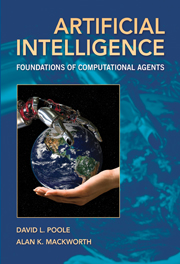Book contents
- Frontmatter
- Contents
- Preface
- I Agents in the World: What Are Agents and How Can They Be Built?
- II Representing and Reasoning
- III Learning and Planning
- 7 Learning: Overview and Supervised Learning
- 8 Planning with Certainty
- 9 Planning Under Uncertainty
- 10 Multiagent Systems
- 11 Beyond Supervised Learning
- IV Reasoning About Individuals and Relations
- V The Big Picture
- A Mathematical Preliminaries and Notation
- Bibliography
- Index
7 - Learning: Overview and Supervised Learning
from III - Learning and Planning
- Frontmatter
- Contents
- Preface
- I Agents in the World: What Are Agents and How Can They Be Built?
- II Representing and Reasoning
- III Learning and Planning
- 7 Learning: Overview and Supervised Learning
- 8 Planning with Certainty
- 9 Planning Under Uncertainty
- 10 Multiagent Systems
- 11 Beyond Supervised Learning
- IV Reasoning About Individuals and Relations
- V The Big Picture
- A Mathematical Preliminaries and Notation
- Bibliography
- Index
Summary
Whoso neglects learning in his youth, loses the past and is dead for the future.
–Euripides (484 BC – 406 BC), Phrixus, Frag. 927Learning is the ability of an agent to improve its behavior based on experience. This could mean the following:
The range of behaviors is expanded; the agent can do more.
The accuracy on tasks is improved; the agent can do things better.
The speed is improved; the agent can do things faster.
The ability to learn is essential to any intelligent agent. As Euripides pointed, learning involves an agent remembering its past in a way that is useful for its future.
This chapter considers supervised learning: given a set of training examples made up of input–output pairs, predict the output of a new input. We show how such learning may be based on one of four possible approaches: choosing a single hypothesis that fits the training examples well, predicting directly from the training examples, selecting the subset of a hypothesis space consistent with the training examples, or finding the posterior probability distribution of hypotheses conditioned on the training examples.
Chapter 11 goes beyond supervised learning and considers clustering (often called unsupervised learning), learning probabilistic models, and reinforcement learning. Section 14.2 (page 606) considers learning relational representations.
- Type
- Chapter
- Information
- Artificial IntelligenceFoundations of Computational Agents, pp. 283 - 348Publisher: Cambridge University PressPrint publication year: 2010
- 1
- Cited by



